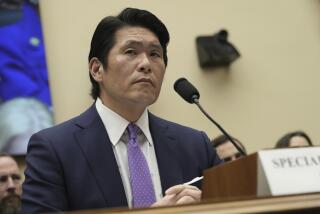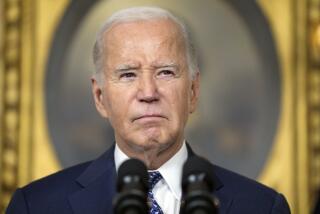Libby defense says witnesses also suffered memory lapses
- Share via
WASHINGTON — I. Lewis “Scooter” Libby’s defense against perjury charges, which rests in part on what he has described as innocent memory lapses, appeared to gain some ground Wednesday when his lawyers showed that two government witnesses in the case had memory issues of their own.
Former CIA official Robert Grenier, questioned by Libby’s lawyers, acknowledged that he initially told a federal grand jury in January 2004 that he did not believe he had shared information about the status of CIA operative Valerie Plame when he spoke with Libby weeks before she was identified in a newspaper column. But Grenier said he testified 18 months later in another grand jury appearance that he believed he had given Libby that information after all.
Grenier was called by the government to help prove the central charge against Libby: that contrary to what he told investigators, Libby obtained information about Plame, the wife of an administration war critic, before her identity surfaced July 14, 2003, in a syndicated column by Robert Novak. Libby, Vice President Dick Cheney’s former chief of staff, told a grand jury that he learned about Plame from journalists and had passed along gossip they offered him. The government claims that he made up the story in an apparent effort to protect his boss.
Another official -- Marc Grossman, a former State Department undersecretary for political affairs -- also testified Wednesday that he had discussed Plame with Libby but conceded there were discrepancies in the accounts that he had initially given FBI agents. Grossman said he could not account for the differences.
Grenier said he changed his testimony after reflecting on a feeling of guilt that he had after talking with Libby and the possibility that he had shared potentially classified information with him. He also said it was becoming apparent from newspaper reports that how and when Libby learned about Plame was becoming of paramount interest to investigators.
The disclosures, on the first full day of the perjury and obstruction trial, appeared to buttress a central defense claim.
Libby, through his lawyers, has conceded that he may have misspoken to investigators, but only because he was preoccupied with matters of national security, which clouded his ability to recall events.
His lawyers were able to show Wednesday that such memory problems may be an occupational hazard for high government officials.
“Do you find that your memory gets better the further away from an event you are?” William Jeffress, one of Libby’s lawyers, asked Grenier. “Your memory improves with time?”
Grenier, who was the CIA’s point man on Iraq at the time of his conversation with Libby, said he could not account for any single event that changed his thinking. “I developed the growing conviction that I had in fact said it,” he said. “It’s like, ‘Wake up and smell the coffee. You must’ve told him.’ ”
Plame is married to former envoy Joseph C. Wilson IV; in an opinion piece in the New York Times on July 6, 2003, Wilson said that President Bush had misled the nation in his State of the Union address when he said Saddam Hussein was seeking weapons-grade uranium in Niger. Wilson had assessed the claim on a CIA-sponsored trip to the African country in 2002 and concluded that it was baseless. Articles about his trip began to appear in newspapers in May 2003.
Both Grenier and Grossman testified that Libby had called them in June 2003 to ask if they knew anything about the then-anonymous ambassador and the circumstances of the trip.
The discussions, they testified, eventually led them to disclose information about Plame to Libby.
Grenier said he treated the request with urgency and recalled being pulled out of a meeting with then-CIA Director George J. Tenet to take a phone call from Libby. “Someone came to the door and beckoned me out.... I went out of the conference room and I was handed a note indicating that I should call Mr. Libby,” he said. “I don’t think I had ever been called out of a meeting with the director either before or since.”
Grossman ordered up a State Department report that chronicled the Wilson trip, which mentioned that his wife worked for the CIA, a fact that he passed along to Libby.
Theodore V. Wells Jr., another of Libby’s lawyers, questioned Grossman about conversations he had with then-Deputy Secretary of State Richard Armitage immediately before and after Grossman spoke to the FBI for the first time in October 2003. Grossman said that Armitage divulged to him what was then a major secret: that Armitage had been the source for the Novak article about Plame.
Grossman said he was glad Armitage had decided to confide in him before his FBI interview.
“He said it was the dumbest thing he’d ever done in his life,” Grossman said. “He said he felt terrible about it, that he’d offered to quit and reported it fully to the FBI. I was shocked and disappointed. But for me, I thought he’d given me a piece of professional courtesy, and I appreciated it.”
During questioning, Wells said that a transcript of Grossman’s FBI interviews indicated he had known before he commissioned the State Department report that Plame worked for the CIA, though he testified Tuesday that the document was his original source for the information.
“You accept the fact that you told the FBI something different on Feb. 24, 2004, than you told this jury?” Wells asked.
“Yes, sir,” Grossman replied.
The prosecution on Wednesday scored some points in trying to rebut what some lawyers have called Libby’s “busy man” defense.
The government introduced notes taken by Libby’s CIA briefer during a meeting in June 2003. The notes revealed that Libby had taken time out to visit with actor Tom Cruise and his then-girlfriend Penelope Cruz, who had requested time with the influential administration aide to complain about German government criticism of Scientology -- of which Cruise is a well-known follower.
“Mr. Libby told me about it during the briefing,” Craig Schmall, the CIA briefer, said. “He was a little excited about it. I was a little excited about it.”
The trial is expected to resume today, with testimony from former Cheney spokeswoman Cathie Martin.
*
More to Read
Sign up for Essential California
The most important California stories and recommendations in your inbox every morning.
You may occasionally receive promotional content from the Los Angeles Times.










